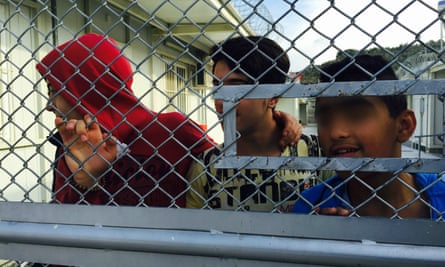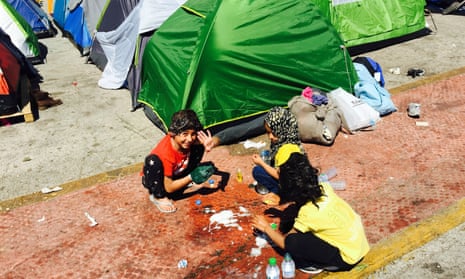Despite its barbed wire and razor strip fencing and armed guards, Amygdaleza, Greece’s notorious detention centre for child refugees, in many ways is testimony to children doing childish things.
There is the girdle of graffiti on its walls, the hand-drawn pictures of animals and flowers. There are the slogans daubed high and low: “I love you”, “I miss you”, “life is love”. And beyond its ill-lit dormitories – little more than grimy mattresses on grimy plinths – there’s a playground of sorts with two goalposts and polychrome walls.
Then there are the inmates, some as young as 12, wide-eyed, fresh-faced, as quick to laugh as they are to cry.
You hear the hubbub and you do not think of a prison; you think of a school. But that is what Amygdaleza is: a camp initially established to host undocumented migrants – in a police academy on the north-western edge of Athens – but now home to up to 40 unaccompanied minors at any given time.
In other places, in other eras, the flat-roofed building might have passed as a borstal. In Athens – on the frontline of Europe’s worst refugee crisis since the second world war – it is a holding pen for innocents whose conditions, in the words of a scathing report issued by Human Rights Watch on Friday, is not only deplorable but should never exist. Greek authorities call it a “special place for the accommodation of foreigners”, part of a chain of closed facilities available to some of the 3,464 migrant children registered nationwide. As a measure of last resort, minors, they say, are placed in such institutions for lack of viable alternatives and for their own protection.
Under the watchful gaze of the guards, their eyes darting this way and that, the detainees – all boys from countries that, on our visit, include Algeria, Syria, Tunisia, Pakistan and Iraq – prefer to watch their words. This is not where any of them intended to be. Each, in his own way, shares the common story of dodging bullets and worse to get to Europe – the imagined utopia at the end of a journey sometimes triggered by the need to flee poverty but, more often than not, persecution and war.
That they have got here at all, in conditions that adults might find hard to survive, past smugglers and criminal gangs is, in itself, a story of courage and resolve. Some start out alone but just as many lose their families in shipwrecks and other tragedies along the way. “None of us want to be here,” says Ahmed Kamshle, a 14-year-old Syrian brandishing his papers. “And some of us have been here for a very long time. The food is very bad and there are rats.”
It is a plight that is not lost on Stathis Sidoropoulos, the police officer in charge of Amygdaleza’s youth wing who has demanded that the dormitories be scrubbed clean for our visit.
A mild-mannered man with two children of his own, Sidoropoulos is the first to say that none of the minors should be behind bars. “If our state weren’t bankrupt, if it had been properly prepared, they wouldn’t be here,” he says, his soft dark eyes looking into the distance. “If you can help improve the conditions that would be good. All day they have got nothing to do. Games would help but so, too, would mattresses, pillows, sheets and soap. In a few words, we need everything really.”
When Sidoropoulos took the job a year ago he had dreams of transforming Amygdaleza. “I had a vision. I said to myself, when you leave you will have brought a little bit of Europe to this place. But look around you! There are two goalposts in the courtyard and no ball. There’s an activity room but we have no computers. There’s a TV with no satellite connection so, unless they speak Greek, the kids never watch it. And, you know, we say all this and nobody wants to listen.”
In the folds of history there are stories that go untold. In Greece, in Amygdaleza, in detention centres and police holding cells up and down the country, it is these children – by far the most vulnerable of the more than a million migrants to have crossed Greek borders – who have been forgotten.
For the Greek state – in barely disguised meltdown after six years of economic freefall – the minors are an embarrassment but also a glitch. Faced with a chronic shortage of space, its island camps brimming, its shelters practically nonexistent, its asylum-seeking system stretched to breaking point, its reaction has been to deal with the children as if they don’t exist.
“The problem is no one sees them,” says Sofia Kouvelaki at the Bodossaki Foundation, a philanthropic organisation now prioritising the minors’ plight. “And by failing to recognise them for what they are, as the most vulnerable among the migrant flows [into the EU], they have been marginalised to the point of invisibility.”
It is a fool’s game. One that starts with violence, she says, but will beget violence, too. “It is a circle of violence. They start off fleeing it, then they experience it once they get here and at some point they will express it,” she sighs. “Because who, after all, is going to deal with their anger and despair?”

What NGOs, charities, psychologists and social workers are discovering is that the flipside of grit, the mirror image of courage and resolve, is a vulnerability both destructive and brittle. “Psychologically they have huge problems; they self-harm, they cut themselves up, they use their hands and arms as weapons,” says Tzanetos Antypas, who heads Greece’s biggest humanitarian organisation, Praksis.
A social worker-cum-academic with vast experience handling those worst affected by the country’s near-economic collapse, Antypas finds it hard to hide his own emotion when he recounts what he has witnessed.
Unaccompanied minors involved earlier this year in a revolt at the closed reception centre on Lesbos – the Aegean island that has borne the brunt of the migrant influx – emerged with shocking disabilities. “Many had been kept in custody for as long as 100 days, four times longer than the time allowed legally,” he recalls. “There were some, I’m not kidding, whose hair had turned white. When we moved them to an open camp they chose to remain listless in their tents. After so many months incarcerated in such overcrowded conditions, I was told they had forgotten how to walk.”
Antypas, like Kouvelaki, is one of the heroes in this drama. Bodossaki, a privately run foundation, and Praksis, with more than 2,000 volunteers nationwide, have no desire to replace the state. But what is certain is that they are supplementing it in ways both vital and clear. “If it weren’t for the charitable foundations and NGOs things would be very difficult,” admits Lefteris Papagiannakis, Athens’ vice-mayor on migrant and refugee affairs. “They’ve been crucial in these very hard times.”
All agree that the story is as much about numbers as anything else. With only two state-run shelters – in Athens and on Crete – and 33 run by NGOs and other organisations, around 1,530 unaccompanied minors have formally been placed in accommodation. The rest are either housed with adults in camps or left to fend for themselves, with many resorting to sex for survival. “We need around 400 more shelters,” says Antypas. “And we need to do it fast.”
Among the lucky few are those who have found shelter with the Society for the Care of Minors in a neoclassical house in Athens’ Exarcheia district. The 18 wards, mostly from Pakistan but also Afghanistan and Syria, banter and play as teenagers do. There are games and warm food and a couple who play “mama and papa” to the children.
“I love Greece,” says Rafiullah from Afghanistan. “They have been very good to me. Soon I will be reunited with my uncle in the Netherlands.”
Throughout the summer, organisations such as Bodossaki have worked to create shelters, with 18 children moving into a colourful house in a central Athens neighbourhood last month.
In an ideal world, the minors would be transferred rapidly to other EU countries through relocation and family reunification schemes. “But what is most important,” says Kouvelaki, “is that these children are allowed to be what they are – children – again.”

Comments (…)
Sign in or create your Guardian account to join the discussion